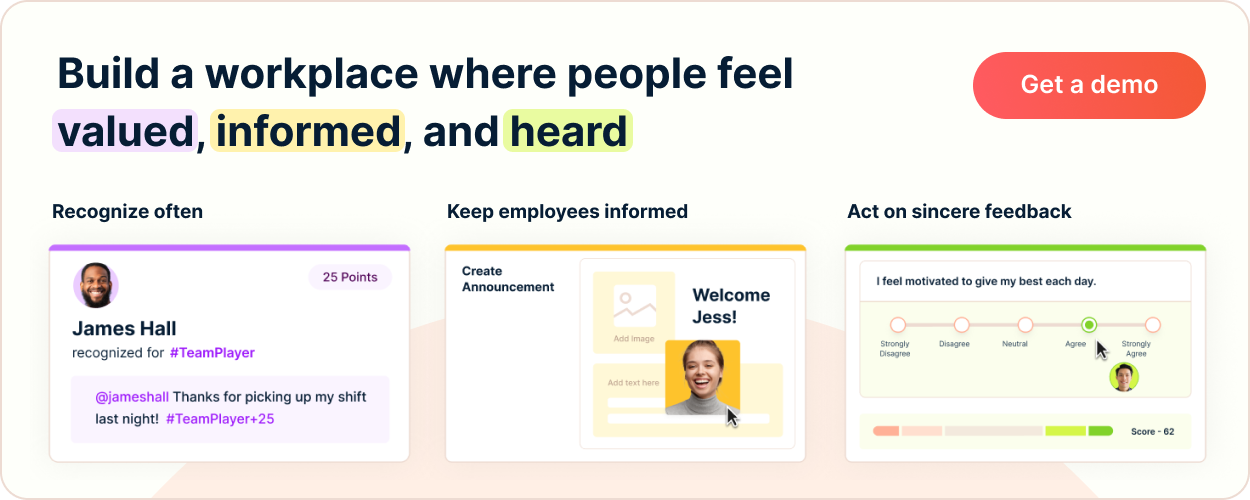What Employees Are Truly Looking For In Company Culture
.avif)
What employees value in company culture is being redefined. It’s much more than occasional corporate swag or free coffee.
Although great, it's not enough. Nowadays, employee expectations have never been higher. So it's time to take a pulse check on your organization.
Is your company a place where employees look forward to dedicating their time each and every day? If you want your employees to say yes without hesitation, and be proud of their workplace, it all starts with company culture. Read on to evaluate how your organization's company culture holds up.

Strong Core Values
At the very foundation of every company is a set of core values. Values should be more than a blurb printed on your website. Rather, look deep within your company and see what fundamental values have been established. Are the current values relevant and resonate with your employees today? If not, don’t be afraid to make some adjustments and rally your team around them.
If you are unsure what are solid, just, relevant, and effective core company values today, then look at best practices from corporate leaders.
You could also hold a conversation about core values with your team to gain their sentiment. In fact, do your employees even know what your core values are?
By re-visiting your core values, you help to strengthen your culture.
Employees want to work for a company that has strong ethics at the core and encourages the team to uphold them.
For instance, when you see an employee that has gone above and beyond and embodies a core value, let them know. Encourage shout-outs and tie them back to your core values. Make sure the core values are fitting for the workforce.
When someone hears about your company within the community, or a potential candidate is about to apply, there will be no doubt about what your company stands for. This will not only help to retain your employees but also attract top-notch candidates to your organization.

Commitment To Mental Wellbeing
Employees have a lot on their plates, from the demands of the office to personal responsibilities and struggles. It can all be a lot.
For an employee to be able to feel and perform their best, it's important for employers to be committed to prioritizing their employees’ mental well-being. Companies that have a flexible, understanding, and empathetic attitude will help employees to prevent burnout, frustration, and even turnover.
Encourage your employees to take a mental health day. Everyone needs time to unplug from work and de-stress. Encourage your employees to be aware of the symptoms of stress, anxiety, or depression, and understand that it’s okay to let your manager know you may be struggling and need a break.
Stress levels are high amongst workers. According to an American Psychological Association survey on work and well-being, of 1,501 workers surveyed, “79% of employees had experienced work-related stress in the month before the survey.”
“79% of employees had experienced work-related stress in the month before the survey.”
Therefore, it is important to connect employees with resources in the community if they feel they are struggling. Host workshops on employee stress management, and provide a list of services that employees can utilize, such as wellness challenges, stress relief apps, or even where they can connect with an online therapist to help them balance personal and professional-related stress.
Empowering and championing your employees' mental wellness can help your workforce and your bottom line. The happier your workforce is the more productive they will be. They will be able to dedicate themselves to your company goals, as well.
Tracks For Professional Advancement
Employees are sure to be on board and invested in your organization if they feel that their career matters.
That means employees should have access to upward mobility within organizations. Sometimes organizations can become caught up in constantly hiring and onboarding new employees and often tapping existing talent can fall to the wayside.
Instead of opening up new outside opportunities why not fill open requisitions with employees already at your organization who have proven themselves. Employees will appreciate internal opportunities for growth. It will motivate them to put forth their best effort if they have the opportunity to expand out.
Enhance your program for professional advancement by providing your employees with career development tools. Encourage supervisors to meet with their individual contributors and to hold conversations about career advancement.
For career development conversations, ask your employees where they would like to take their careers, and where they see themselves at the company in the future. This will help employees to feel valued and for the greater potential for them to stay with your organization for the long hall. It also may be difficult for employees to understand how they can move up the corporate ladder. Ensure that everyone has a fair opportunity to do so.
Take a look at your current org structure.
- Is there room for growth for entry-level employees?
- Is there a senior-level position or clear career path options for them?
Make sure you have these tracks in place and mentors to provide professional development opportunities to learn.

A Safe Space
Employees want an atmosphere that provides them with a sense of psychological safety.
Pride yourself in your organization being a safe space. Employees should feel that they can be themselves and talk about things that are on their minds. Employees should be able to feel comfortable speaking with their manager, or team to let them know if they need any additional resources or feel they need to address something at the workplace.
A safe space allows employees to feel comfortable and confident that they are cared about. Allowing employees to feel safe helps them come forth with things they feel they need to chat about can make a big difference.
A safe community brings out the best in your team by fostering empathy, strengthening relationships, and even fostering creativity and innovation.
To expand the concept of a safe space look at your current inclusivity initiatives. Do you have a diversity board or inclusivity board in place?
A diversity board can help to expand the diverse talent you have at your organization, and ensure that all job postings and company materials are resonating with the workforce and are as inclusive as possible. This also helps to build community as the board can create some cultural programming to celebrate important contributions diverse groups have made.
Employees appreciate being able to be part of a diverse team and having the opportunity to work with those from all backgrounds and walks of life as much as possible.
Leadership That Cares
Leadership establishes the precedent and sets the tone for the entire organization.
It is beneficial to reflect on leadership and leadership style. How are leaders behaving, are they empathic and valuing the individual contributor?
Embracing a servant leadership style can help to solidify the workplace being a safe place. Having strong, caring leadership that is not just solely engaging with senior employees can make a big impact on company culture.
Employees don’t like to feel low on the totem pole or feel that being in an entry-level position keeps them from having a voice. Therefore, leadership should strive to keep open lines of communication at all levels within the organization. Employees should feel that they can go to leadership and provide their input.
Giving all employees a voice is the way for the organization to thrive, evolve, and grow.
Otherwise, workflow processes may stay stagnant and inefficient, and employees will continue to experience the same pain points over and over again. Therefore, leadership should hold open forum discussions and be actively seeking feedback from all regardless of tenure.
Try blocking out on the calendar leadership office hours, where employees have a convenient time to drop in to provide input.
A culture of open communication can then be trickled down and manifested in all levels of the organization. Instead of employees remaining silent, they can feel included to bring their ideas to the table.

A Sense Of Community
Employees value a strong sense of community. Focusing on team building and interaction is key to building trust, breaking down departmental silos, and improving morale within your organization.
Employees need to feel connected to their team members so it is important that leaders take time to build this sense of community and camaraderie.
There are many ways to build community within your team and organization.
Host fun team-building activities such as:
- Team challenges
- Trivia
- Talent showcase
- Coffee chat hours
Team building should extend beyond just work and it is easier to build confidence when you learn about each other's interests on a more personal level.
Such fun activities can be held on a weekly basis on Fridays to reflect on the week and also unwind for a bit.
Take the concept a step further. How often do your teams interact with each other? Set up coffee chats for cross-departmental team building. This will help to break up any silos or communication challenges within your organization.
Such types of activities can be held both in-office and remotely via telecommuting. Regularly scheduled team building is especially important for hybrid workforces where employees do not have the ability to interact at the office on a daily basis.
Recognition
Employees don’t just want to be a name on a team roster. They want to be celebrated for the individual they are.
Help employees feel they matter by recognizing special milestones such as:
- Birthdays
- Birth announcements
- Work anniversaries
- Promotions
- Personal achievements (such as graduating with an advanced degree or doing something good for the community)
It's important to not just recognize major wins but even small wins along the way to keep the good energy going.
Why not even consider creating a team player of the week or even an employee of the month award and creating a peer employee recognition system.
Use tools to have peers leave positive feedback, celebrate excellent work, or even a shout-out for embodying core values. Positive encouragement can boost morale and strengthen the community.
In addition, employees are looking for workplaces that do more than just a shout-out. Celebrate your high-achieving contributors by providing a bonus such as an extra PTO day, the ability to work a half-day, or other perks to enjoy.
Investing in your employees and celebrating all they contribute to your organization will help retain your top talent and motivate them to go above and beyond.
Encourages Work-Life Balance
Employees are tired of having companies squeeze every bit out of them, being held to the clock, and excessive time tracking.
Employees don’t like to be micromanaged or feel the pressure of grind culture.
Instead, empower your employees by encouraging them to maintain a healthy work-life balance. Don’t hold employees to the typical nine to five if it isn't necessary for them to drive results. Allow for a flexible schedule where possible.
Some professionals feel more productive when they get an early start and finish the day early, while others may be late risers and find themselves productive by starting and ending the work day later.
Allowing employees to set work hours around their most productive periods can help your employees feel motivated and dialed in.
Additionally, allow flex time. Employees may have children at home that are on different schedules or may need time to go to an appointment. Rather than making an employee tap into their precious PTO, why not allow them to flex their work schedule around their needs? This will help your employees to feel less stressed.
In addition, encourage your employees to unplug. Remind them to not work beyond their scheduled hours, and encourage them to take PTO, a long weekend, or a much-needed getaway to recharge.
Conclusion
A company culture that resonates with your workforce is one that creates a sense of belonging, and that feels as if a difference is being made not only professionally and personally, but for the greater community.
It’s time to think beyond the stats, the deals your team is closing, and really what your company stands for and how it cultivates an environment everyone is proud to be a part of. Even if you are already doing many of these great things at your company, don’t stop evolving.
Continue to grow and take pride in the culture you are developing and setting.













